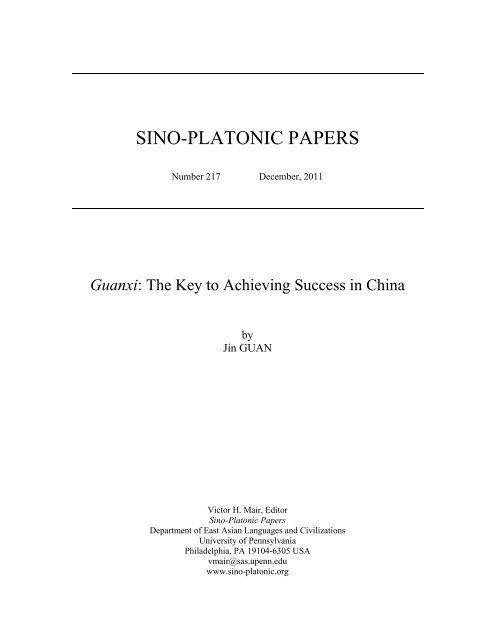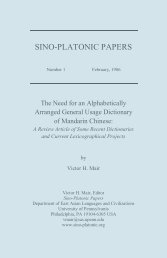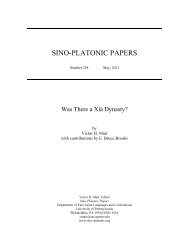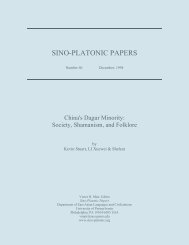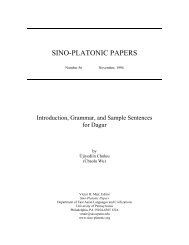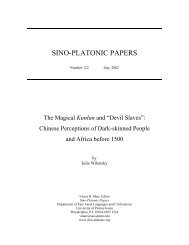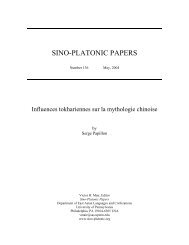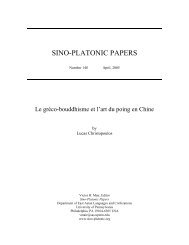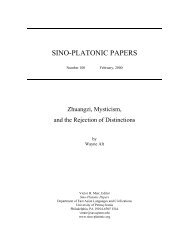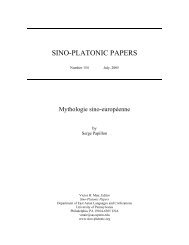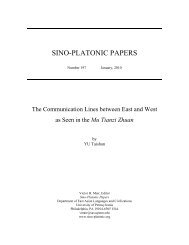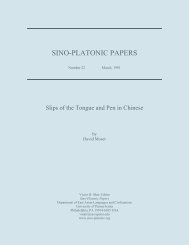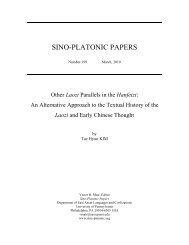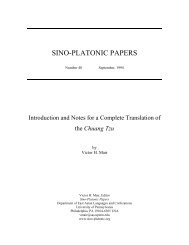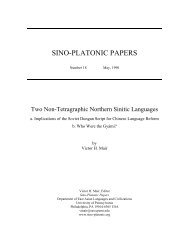Guanxi: The Key to Achieving Success in China - Sino-Platonic Papers
Guanxi: The Key to Achieving Success in China - Sino-Platonic Papers
Guanxi: The Key to Achieving Success in China - Sino-Platonic Papers
Create successful ePaper yourself
Turn your PDF publications into a flip-book with our unique Google optimized e-Paper software.
SINO-PLATONIC PAPERS<br />
Number 217 December, 2011<br />
<strong>Guanxi</strong>: <strong>The</strong> <strong>Key</strong> <strong>to</strong> <strong>Achiev<strong>in</strong>g</strong> <strong>Success</strong> <strong>in</strong> Ch<strong>in</strong>a<br />
by<br />
J<strong>in</strong> GUAN<br />
Vic<strong>to</strong>r H. Mair, Edi<strong>to</strong>r<br />
S<strong>in</strong>o-Pla<strong>to</strong>nic <strong>Papers</strong><br />
Department of East Asian Languages and Civilizations<br />
University of Pennsylvania<br />
Philadelphia, PA 19104-6305 USA<br />
vmair@sas.upenn.edu<br />
www.s<strong>in</strong>o-pla<strong>to</strong>nic.org
SINO-PLATONIC PAPERS<br />
FOUNDED 1986<br />
Edi<strong>to</strong>r-<strong>in</strong>-Chief<br />
VICTOR H. MAIR<br />
Associate Edi<strong>to</strong>rs<br />
PAULA ROBERTS MARK SWOFFORD<br />
ISSN<br />
2157-9679 (pr<strong>in</strong>t) 2157-9687 (onl<strong>in</strong>e)<br />
SINO-PLATONIC PAPERS is an occasional series dedicated <strong>to</strong> mak<strong>in</strong>g available <strong>to</strong> specialists<br />
and the <strong>in</strong>terested public the results of research that, because of its unconventional or controversial<br />
nature, might otherwise go unpublished. <strong>The</strong> edi<strong>to</strong>r-<strong>in</strong>-chief actively encourages younger, not yet<br />
well established, scholars and <strong>in</strong>dependent authors <strong>to</strong> submit manuscripts for consideration.<br />
Contributions <strong>in</strong> any of the major scholarly languages of the world, <strong>in</strong>clud<strong>in</strong>g romanized modern<br />
standard Mandar<strong>in</strong> (MSM) and Japanese, are acceptable. In special circumstances, papers written<br />
<strong>in</strong> one of the S<strong>in</strong>itic <strong>to</strong>polects (fangyan) may be considered for publication.<br />
Although the chief focus of S<strong>in</strong>o-Pla<strong>to</strong>nic <strong>Papers</strong> is on the <strong>in</strong>tercultural relations of Ch<strong>in</strong>a with<br />
other peoples, challeng<strong>in</strong>g and creative studies on a wide variety of philological subjects will be<br />
enterta<strong>in</strong>ed. This series is not the place for safe, sober, and s<strong>to</strong>dgy presentations. S<strong>in</strong>o- Pla<strong>to</strong>nic<br />
<strong>Papers</strong> prefers lively work that, while tak<strong>in</strong>g reasonable risks <strong>to</strong> advance the field, capitalizes on<br />
brilliant new <strong>in</strong>sights <strong>in</strong><strong>to</strong> the development of civilization.<br />
Submissions are regularly sent out <strong>to</strong> be refereed, and extensive edi<strong>to</strong>rial suggestions for revision<br />
may be offered.<br />
S<strong>in</strong>o-Pla<strong>to</strong>nic <strong>Papers</strong> emphasizes substance over form. We do, however, strongly recommend that<br />
prospective authors consult our style guidel<strong>in</strong>es at www.s<strong>in</strong>o-pla<strong>to</strong>nic.org/stylesheet.doc.<br />
Manuscripts should be submitted as electronic files, preferably <strong>in</strong> Microsoft Word format. You<br />
may wish <strong>to</strong> use our sample document template, available here: www.s<strong>in</strong>o-pla<strong>to</strong>nic.org/spp.dot.<br />
Beg<strong>in</strong>n<strong>in</strong>g with issue no. 171, S<strong>in</strong>o-Pla<strong>to</strong>nic <strong>Papers</strong> has been published electronically on the Web<br />
at www.s<strong>in</strong>o-pla<strong>to</strong>nic.org. Issues 1–170, however, will cont<strong>in</strong>ue <strong>to</strong> be sold as paper copies until<br />
our s<strong>to</strong>ck runs out, after which they <strong>to</strong>o will be made available on the Web.<br />
Please note: When the edi<strong>to</strong>r goes on an expedition or research trip, all operations (<strong>in</strong>clud<strong>in</strong>g<br />
fill<strong>in</strong>g orders) may temporarily cease for up <strong>to</strong> three months at a time. In such circumstances, those<br />
who wish <strong>to</strong> purchase various issues of SPP are requested <strong>to</strong> wait patiently until he returns. If<br />
issues are urgently needed while the edi<strong>to</strong>r is away, they may be requested through Interlibrary<br />
Loan. You should also check our Web site at www.s<strong>in</strong>o-pla<strong>to</strong>nic.org, as back issues are regularly<br />
rereleased for free as PDF editions.<br />
S<strong>in</strong>o-Pla<strong>to</strong>nic <strong>Papers</strong> is licensed under the Creative Commons Attribution-NonCommercial-<br />
NoDerivs 2.5 License. To view a copy of this license, visit<br />
http://creativecommons.org/licenses/by-nc-nd/2.5/ or send a letter <strong>to</strong> Creative Commons, 543<br />
Howard Street, 5th Floor, San Francisco, California, 94105, USA.
Introduction<br />
<strong>Guanxi</strong>: <strong>The</strong> <strong>Key</strong> <strong>to</strong> <strong>Achiev<strong>in</strong>g</strong> <strong>Success</strong> <strong>in</strong> Ch<strong>in</strong>a<br />
by J<strong>in</strong> Guan<br />
University of Pennsylvania<br />
What is guanxi? Loosely translated, the term refers <strong>to</strong> connections or relationships between<br />
people. <strong>Guanxi</strong> implies preferential treatment given <strong>to</strong> the partners <strong>in</strong> an exchange, <strong>in</strong> the form of<br />
easy access <strong>to</strong> limited resources, <strong>in</strong>creased access <strong>to</strong> controlled <strong>in</strong>formation, credit grants, and<br />
protection from external competi<strong>to</strong>rs (Lee, 2). Western scholars have looked at guanxi as similar<br />
<strong>to</strong> network<strong>in</strong>g, that is, a form of social capital that has the potential <strong>to</strong> be converted <strong>in</strong><strong>to</strong><br />
economic, political, and symbolic (prestige and status) assets (Y<strong>in</strong>g, 3). However, the Ch<strong>in</strong>ese<br />
concept of guanxi is actually different from this, ma<strong>in</strong>ly due <strong>to</strong> the notion of reciprocal obligation<br />
and <strong>in</strong>debtedness. To the Ch<strong>in</strong>ese people, guanxi is a system of renq<strong>in</strong>g (favors), <strong>in</strong> which<br />
obligation and <strong>in</strong>debtedness are manufactured, and <strong>in</strong> which there is no time limit for repayment<br />
(Gold, 7). <strong>The</strong> Ch<strong>in</strong>ese always try <strong>to</strong> return any renq<strong>in</strong>g and expect the other party <strong>to</strong> do the same<br />
when a favor is given (Z<strong>in</strong>zius, 183). <strong>The</strong>refore, one can look at renq<strong>in</strong>g as the exchange<br />
currency for cultivat<strong>in</strong>g guanxi. <strong>The</strong> more renq<strong>in</strong>g one accumulates, the more likely the other<br />
party is <strong>to</strong> reciprocate when solicited later. Hence, renq<strong>in</strong>g can be seen as a yardstick by which<br />
one can measure how strong guanxi is between two parties.<br />
In this paper, I will first explore the cultural and legal fac<strong>to</strong>rs that <strong>in</strong>fluence the role<br />
guanxi plays <strong>to</strong>day <strong>in</strong> Ch<strong>in</strong>ese society. <strong>The</strong>n I will demonstrate the significant power of guanxi<br />
through a case study that shows how an ord<strong>in</strong>ary Ch<strong>in</strong>ese laborer’s outstand<strong>in</strong>g ability <strong>in</strong><br />
cultivat<strong>in</strong>g guanxi permitted him <strong>to</strong> become one of the wealthiest and most powerful people <strong>in</strong><br />
Ch<strong>in</strong>a. Through this case study, several po<strong>in</strong>ts about guanxi will be demonstrated:<br />
• the proper understand<strong>in</strong>g and application of guanxi can transform one’s life;<br />
• guanxi can be developed through personal efforts without the benefit of a powerful<br />
family background;
J<strong>in</strong> GUAN, “<strong>Guanxi</strong>: <strong>The</strong> <strong>Key</strong> <strong>to</strong> <strong>Achiev<strong>in</strong>g</strong> <strong>Success</strong> <strong>in</strong> Ch<strong>in</strong>a”<br />
S<strong>in</strong>o-Pla<strong>to</strong>nic <strong>Papers</strong>, 217 (December, 2011)<br />
• the best way <strong>to</strong> cultivate guanxi is <strong>to</strong> identify and satisfy the other party’s greatest needs<br />
and desires.<br />
On the subject of how <strong>to</strong> develop guanxi, I will offer my critique of those scholars who<br />
focus <strong>to</strong>o much on the ritual aspect of properly generat<strong>in</strong>g renq<strong>in</strong>g, through banquets and gift-<br />
giv<strong>in</strong>g. In my op<strong>in</strong>ion, these scholars have overlooked the importance of value creation for the<br />
party with whom one tries <strong>to</strong> develop guanxi. Instead, I believe that the best way <strong>to</strong> cultivate<br />
guanxi is <strong>to</strong> identify the other party’s greatest needs and then f<strong>in</strong>d a way <strong>to</strong> fulfill the needs for<br />
him or her. This creates the most value for the other party and allows one <strong>to</strong> accumulate the<br />
renq<strong>in</strong>g necessary <strong>to</strong> utilize guanxi later. F<strong>in</strong>ally, <strong>in</strong> the last part of this paper, I will exam<strong>in</strong>e the<br />
outlook for guanxi <strong>in</strong> Ch<strong>in</strong>a’s future.<br />
<strong>The</strong> Cultural and Legal Influence on <strong>Guanxi</strong><br />
In exam<strong>in</strong><strong>in</strong>g the role of guanxi <strong>in</strong> modern Ch<strong>in</strong>a, we must recognize that there are a number of<br />
legal and cultural fac<strong>to</strong>rs conducive <strong>to</strong> its existence. <strong>The</strong> legal structure of Ch<strong>in</strong>a is not set up <strong>in</strong><br />
the same way as that of the West. Accord<strong>in</strong>g <strong>to</strong> the authors of “Combat<strong>in</strong>g Piracy through<br />
<strong>Guanxi</strong>,” the legal system <strong>in</strong> Ch<strong>in</strong>a “is plagued by ambiguity and a lack of structure, mak<strong>in</strong>g<br />
legal <strong>in</strong>terpretation a very subjective process.” Formal rules and procedures are often <strong>in</strong>terpreted<br />
and applied accord<strong>in</strong>g <strong>to</strong> the arbitrary views of powerful officials. Personal <strong>in</strong>terpretation of the<br />
law promotes guanxi (Dayal-Gulati, 120), because guanxi is cultivated as a cop<strong>in</strong>g mechanism <strong>in</strong><br />
the absence of a reliable and impartial government and an established rule of law (Gold, 179).<br />
Furthermore, the pervasive mentality of government corruption has made develop<strong>in</strong>g guanxi<br />
with the rul<strong>in</strong>g elite essential. <strong>The</strong> Communist Party of Ch<strong>in</strong>a wanted <strong>to</strong> employ laws <strong>to</strong><br />
prosecute offenders while keep<strong>in</strong>g the party’s rul<strong>in</strong>g elite above the law (McGrover, 96).<br />
Through the case study, one can see clearly the subjective nature of law, s<strong>in</strong>ce the law could<br />
easily be <strong>in</strong>terpreted <strong>in</strong> any way the officials deem proper. Naturally, if someone has a good<br />
guanxi with the official <strong>in</strong> charge, the official could <strong>in</strong>terpret the rules <strong>in</strong> the way that is favorable<br />
for that person.<br />
Confucianism has an enormous <strong>in</strong>fluence on the way Ch<strong>in</strong>ese people perceive others <strong>in</strong><br />
society, and the reciprocal nature of guanxi is deeply rooted <strong>in</strong> Confucianism. Accord<strong>in</strong>g <strong>to</strong> the<br />
2
J<strong>in</strong> GUAN, “<strong>Guanxi</strong>: <strong>The</strong> <strong>Key</strong> <strong>to</strong> <strong>Achiev<strong>in</strong>g</strong> <strong>Success</strong> <strong>in</strong> Ch<strong>in</strong>a”<br />
S<strong>in</strong>o-Pla<strong>to</strong>nic <strong>Papers</strong>, 217 (December, 2011)<br />
Confucian classic, <strong>The</strong> Book of Rites, “What the rules of propriety value is that of reciprocity. If I<br />
give a gift and noth<strong>in</strong>g comes <strong>in</strong> return, that is contrary <strong>to</strong> propriety; if the th<strong>in</strong>g comes <strong>to</strong> me,<br />
and I give noth<strong>in</strong>g <strong>in</strong> return, which also is contrary <strong>to</strong> propriety…. Worthy bes<strong>to</strong>wers of k<strong>in</strong>dness<br />
will not expect gratitude, while grateful receivers of grace will certa<strong>in</strong>ly make a return…. All<br />
sources and roots of disaster and disorder come from failure <strong>in</strong> return<strong>in</strong>g grace” (Xu, 9, 321).<br />
Confucius’s teach<strong>in</strong>g was given thousands of years ago, yet the Ch<strong>in</strong>ese people’s social behavior<br />
<strong>to</strong>day still reflects this belief <strong>in</strong> reciprocity.<br />
Case Study: Lai Changx<strong>in</strong>g<br />
<strong>The</strong> case study that follows is taken primarily from Chapter 3, “Eat<strong>in</strong>g the Emperor’s Gra<strong>in</strong>,” of<br />
James McGregor’s book One Billion Cus<strong>to</strong>mers. <strong>The</strong> author conducted several personal<br />
<strong>in</strong>terviews with Lai Changx<strong>in</strong>g and <strong>in</strong>corporated <strong>in</strong>formation from other primary sources <strong>to</strong><br />
present the s<strong>to</strong>ry beh<strong>in</strong>d the largest corruption case <strong>in</strong> modern Ch<strong>in</strong>ese his<strong>to</strong>ry. However, I want<br />
<strong>to</strong> rem<strong>in</strong>d readers that l<strong>in</strong>k<strong>in</strong>g guanxi with political cronyism is not the focus of my paper. <strong>The</strong><br />
purpose of this paper is <strong>to</strong> illum<strong>in</strong>ate the mean<strong>in</strong>g of guanxi through the three po<strong>in</strong>ts I outl<strong>in</strong>ed<br />
earlier: (1) proper understand<strong>in</strong>g and application of guanxi can transform one’s life; (2) guanxi<br />
can be developed through personal efforts, without the benefit of a powerful family background;<br />
and (3) the best way <strong>to</strong> establish guanxi is through identify<strong>in</strong>g and satisfy<strong>in</strong>g the other party’s<br />
greatest needs.<br />
Lai Changx<strong>in</strong>g was born <strong>in</strong> 1958 <strong>in</strong> Shaocuo, a farm village located <strong>in</strong> the foothills near<br />
the coast of Fujian prov<strong>in</strong>ce <strong>in</strong> Southeast Ch<strong>in</strong>a. Like most Ch<strong>in</strong>ese peasant entrepreneurs, he<br />
grew up ill-educated (hav<strong>in</strong>g completed only three years of his elementary school education),<br />
hyperactive, and optimistic. He believed that if he just kept scrambl<strong>in</strong>g for the next opportunity,<br />
his future would certa<strong>in</strong>ly be better than his impoverished past. Most importantly, he unders<strong>to</strong>od<br />
that personal relationships with people <strong>in</strong> power were the means <strong>to</strong> open opportunities and get<br />
th<strong>in</strong>gs done <strong>in</strong> Ch<strong>in</strong>a. When Lai was young, he worked <strong>in</strong> the family’s t<strong>in</strong>y farm plot and jo<strong>in</strong>ed<br />
his two eldest brothers <strong>in</strong> a ditch-digg<strong>in</strong>g brigade at a military camp. Lai hated the backbreak<strong>in</strong>g<br />
work, and he hated hav<strong>in</strong>g bosses. He was determ<strong>in</strong>ed <strong>to</strong> live a life different from that of his<br />
ances<strong>to</strong>rs, who wore out their bodies do<strong>in</strong>g hard labor, end<strong>in</strong>g up <strong>in</strong> hillside graves. How did Lai<br />
3
J<strong>in</strong> GUAN, “<strong>Guanxi</strong>: <strong>The</strong> <strong>Key</strong> <strong>to</strong> <strong>Achiev<strong>in</strong>g</strong> <strong>Success</strong> <strong>in</strong> Ch<strong>in</strong>a”<br />
S<strong>in</strong>o-Pla<strong>to</strong>nic <strong>Papers</strong>, 217 (December, 2011)<br />
realize his desire <strong>to</strong> rise from these beg<strong>in</strong>n<strong>in</strong>gs as a poor farmer and become a self-made<br />
billionaire?<br />
Lai’s ambition co<strong>in</strong>cided perfectly with the economic reforms launched by Deng<br />
Xiaop<strong>in</strong>g, the paramount leader who essentially <strong>in</strong>troduced capitalism <strong>in</strong><strong>to</strong> Ch<strong>in</strong>a. Look<strong>in</strong>g <strong>to</strong><br />
seize the opportunity, Lai and four of his friends put <strong>to</strong>gether the equivalent of US$180 and<br />
bought forg<strong>in</strong>g equipment <strong>to</strong> make car lug nuts and other simple parts. His gregarious personality<br />
and <strong>in</strong>defatigable energy then persuaded some companies <strong>to</strong> appo<strong>in</strong>t him as their national sales<br />
representative. Travel<strong>in</strong>g around the country on their behalf fueled his ambition even further,<br />
because he saw himself on the start<strong>in</strong>g l<strong>in</strong>e <strong>to</strong> become gloriously rich. In addition <strong>to</strong> the<br />
prospects he saw <strong>in</strong> his travels, he tried <strong>to</strong> make the best of his available opportunities by<br />
establish<strong>in</strong>g a personal connection with a worker employed <strong>in</strong> a state-owned textile fac<strong>to</strong>ry <strong>in</strong><br />
Shandong. It was from this person that he bought textile mach<strong>in</strong>ery bluepr<strong>in</strong>ts, for US$2,500. He<br />
copied the mach<strong>in</strong>ery and thereby became a market leader <strong>in</strong> the garment export bus<strong>in</strong>ess. This<br />
was the first significant capital that he generated, and it was done through cultivat<strong>in</strong>g guanxi with<br />
the fac<strong>to</strong>ry worker.<br />
After establish<strong>in</strong>g himself as a bus<strong>in</strong>ess owner, Lai began <strong>to</strong> organize his own trade fairs<br />
by <strong>in</strong>vit<strong>in</strong>g buyers <strong>to</strong> Fujian, because he knew that many of them wanted <strong>to</strong> enjoy the abundant<br />
sunsh<strong>in</strong>e and delicious seafood available <strong>in</strong> the coastal <strong>to</strong>wn. When the buyers arrived <strong>in</strong> Fujian,<br />
he organized banquets <strong>to</strong> w<strong>in</strong>e and d<strong>in</strong>e them, ensur<strong>in</strong>g that each buyer had a very positive<br />
experience <strong>in</strong> the region. Most of them agreed <strong>to</strong> deals with Lai after these pleasant experiences<br />
because they felt obligated <strong>to</strong> reciprocate the host’s hospitality. <strong>The</strong> positive results of identify<strong>in</strong>g<br />
and satisfy<strong>in</strong>g his target audience’s needs taught Lai how <strong>to</strong> become the master of build<strong>in</strong>g<br />
guanxi. He later attributed his success <strong>in</strong> develop<strong>in</strong>g guanxi <strong>to</strong> “look<strong>in</strong>g for and satisfy<strong>in</strong>g other<br />
people’s hobbies and needs.”<br />
By the late 1980s, Lai was <strong>in</strong>trigued by the big money <strong>to</strong> be made <strong>in</strong> the electronics<br />
bus<strong>in</strong>ess. At the time, however, nearly all electronic goods <strong>in</strong> Ch<strong>in</strong>a were imported by smugglers.<br />
Situated directly across from Taiwan, Fujian had long been a hotbed of smuggl<strong>in</strong>g. Because of<br />
the political tension between Taiwan and Ch<strong>in</strong>a, the Taiwan Strait was rigidly controlled by the<br />
military and police. Lai concluded that success <strong>in</strong> the electronics bus<strong>in</strong>ess required good guanxi<br />
4
J<strong>in</strong> GUAN, “<strong>Guanxi</strong>: <strong>The</strong> <strong>Key</strong> <strong>to</strong> <strong>Achiev<strong>in</strong>g</strong> <strong>Success</strong> <strong>in</strong> Ch<strong>in</strong>a”<br />
S<strong>in</strong>o-Pla<strong>to</strong>nic <strong>Papers</strong>, 217 (December, 2011)<br />
with the military and police. First, Lai set up his electronics smuggl<strong>in</strong>g operation <strong>in</strong> Shishi, a<br />
coastal city <strong>in</strong> Fujian known as a smuggl<strong>in</strong>g center. Understand<strong>in</strong>g that many employees with<strong>in</strong><br />
the local authority needed <strong>to</strong> earn extra money <strong>to</strong> complement their poorly paid government<br />
salaries, Lai did not hesitate <strong>to</strong> provide extra f<strong>in</strong>ancial <strong>in</strong>centives for these employees <strong>to</strong> help him<br />
with his bus<strong>in</strong>ess. He even provided police officers with Taiwanese cars, which could not legally<br />
be imported <strong>in</strong><strong>to</strong> Ch<strong>in</strong>a. In return, Lai was given the privilege of sett<strong>in</strong>g up his electronic retail<br />
s<strong>to</strong>res <strong>in</strong> a hotel owned by the police. Private enterprise was not allowed dur<strong>in</strong>g the early days of<br />
reform, and thus Lai’s operations had <strong>to</strong> be housed under local government agencies. As Lai’s<br />
guanxi with the local officials grew stronger, more government officials came ask<strong>in</strong>g for renq<strong>in</strong>g<br />
from Lai <strong>in</strong> the form of money <strong>to</strong> fund their pet projects <strong>in</strong> order <strong>to</strong> score political po<strong>in</strong>ts. In<br />
return, the government officials presented Lai with impressive awards and patriotic titles.<br />
When everyth<strong>in</strong>g seemed <strong>to</strong> be go<strong>in</strong>g well, an <strong>in</strong>cident <strong>to</strong>ok place that would drive Lai<br />
out of the city of Shishi. Because Lai never established guanxi with anyone from the area’s tax<br />
bureau, one night his bus<strong>in</strong>esses were raided by officials from the local tax office. Wish<strong>in</strong>g <strong>to</strong><br />
avoid legal battles <strong>in</strong> court, Lai swallowed his losses and left the city with the US$4 million that<br />
he had earned from the smuggl<strong>in</strong>g operations. He learned a hard lesson from this <strong>in</strong>cident: that<br />
he must develop a network of guanxi <strong>to</strong> cover all potential risks <strong>to</strong> his operations. Lai’s next s<strong>to</strong>p<br />
was the city of Xiamen, located <strong>in</strong> the southern part of Fujian. This city would become the<br />
headquarters of his future bus<strong>in</strong>ess empire. But before he turned Xiamen <strong>in</strong><strong>to</strong> his headquarters,<br />
Lai would strike another deal with the local police <strong>to</strong> help him emigrate <strong>to</strong> Hong Kong. In return<br />
he would cover the accommodation, food, and enterta<strong>in</strong>ment expenses for any police officers and<br />
<strong>in</strong>telligence operatives who visited Hong Kong.<br />
Lai’s stay <strong>in</strong> Hong Kong strengthened his guanxi with various officials <strong>in</strong> the Ch<strong>in</strong>ese<br />
military. While the military and <strong>in</strong>telligence officers enjoyed the hospitality provided by Lai,<br />
they had a greater need, that of gather<strong>in</strong>g <strong>in</strong>formation on the activities of Taiwanese authorities <strong>in</strong><br />
Hong Kong. Lai leveraged his Fujian ancestral orig<strong>in</strong>, which was shared by eighty percent of the<br />
Taiwanese population, <strong>to</strong> ga<strong>in</strong> access <strong>to</strong> a Taiwanese spy chief <strong>in</strong> Hong Kong. When Lai<br />
discovered that the Taiwanese spy wanted <strong>to</strong> defect <strong>to</strong> Ch<strong>in</strong>a, he was able <strong>to</strong> obta<strong>in</strong> a list of the<br />
names of Taiwanese agents <strong>in</strong> Ch<strong>in</strong>a and delivered the list <strong>to</strong> Ch<strong>in</strong>ese <strong>in</strong>telligence officers. This<br />
5
J<strong>in</strong> GUAN, “<strong>Guanxi</strong>: <strong>The</strong> <strong>Key</strong> <strong>to</strong> <strong>Achiev<strong>in</strong>g</strong> <strong>Success</strong> <strong>in</strong> Ch<strong>in</strong>a”<br />
S<strong>in</strong>o-Pla<strong>to</strong>nic <strong>Papers</strong>, 217 (December, 2011)<br />
act abundantly fulfilled the “greatest need” of an <strong>in</strong>telligence officer from the Ch<strong>in</strong>ese military,<br />
who then owed Lai a very big renq<strong>in</strong>g <strong>to</strong> be repaid later. Not only was Lai successful <strong>in</strong><br />
cultivat<strong>in</strong>g more guanxi, he was also able <strong>to</strong> make a huge profit from <strong>in</strong>vest<strong>in</strong>g <strong>in</strong> the boom<strong>in</strong>g<br />
Hong Kong real estate market. He would return <strong>to</strong> Xiamen with US$40 million and a very strong<br />
network of guanxi as a foreign <strong>in</strong>ves<strong>to</strong>r who enjoyed tax breaks from Ch<strong>in</strong>ese government.<br />
With help from a friend <strong>in</strong> the local government, Lai quickly set up a trad<strong>in</strong>g firm called<br />
Yuanhua International, which owned various bus<strong>in</strong>esses that produced car stereos and assembled<br />
computer parts. He set up his office on the <strong>to</strong>p floor of the <strong>in</strong>famous Red Mansion, which was a<br />
seven-s<strong>to</strong>ry build<strong>in</strong>g on land owned by the Xiamen police department. <strong>The</strong> Red Mansion was the<br />
place where Lai cultivated and ma<strong>in</strong>ta<strong>in</strong>ed his network of guanxi with various government<br />
officials. Although it looked like any Ch<strong>in</strong>ese office build<strong>in</strong>g from the outside, the <strong>in</strong>side of the<br />
Red Mansion <strong>in</strong>cluded a warren of private banquet rooms, a forty-seat movie theater, private<br />
karaoke lounges, sauna and massage facilities, and a half dozen guest rooms. To serve Lai’s<br />
government official friends, the Red Mansion housed great cooks from Hong Kong and beautiful<br />
young women from all over Ch<strong>in</strong>a. Remember<strong>in</strong>g the lesson he learned <strong>in</strong> Shishi, Lai wanted <strong>to</strong><br />
make sure all aspects of government relations were directly under his control. He revealed that<br />
the only government officials he was afraid of were those without “hobbies,” which typically<br />
referred <strong>to</strong> money or women.<br />
Lai proved his impressive ability <strong>to</strong> identify anyone’s “hobbies” when he tried <strong>to</strong><br />
establish guanxi with a government official who was not <strong>in</strong>terested <strong>in</strong> either money or women.<br />
Comprehensive research through his guanxi network led <strong>to</strong> the discovery that this government<br />
official was a connoisseur of calligraphy. Lai was able <strong>to</strong> obta<strong>in</strong> several of the most prestigious<br />
calligraphy works, worth hundreds of thousands of dollars, and presented them <strong>to</strong> this official as<br />
a gift. Through this endeavor, Lai made the government official feel <strong>in</strong>debted and obligated <strong>to</strong><br />
reciprocate the favor. Another way <strong>in</strong> which Lai developed his guanxi network was through<br />
help<strong>in</strong>g friends <strong>in</strong> government advance their political careers. When Zhuang Rushun had been a<br />
mere traffic cop <strong>in</strong> Shishi, Lai imported and donated satellite telephone equipment that Officer<br />
Zhuang used <strong>to</strong> set up a traffic moni<strong>to</strong>r<strong>in</strong>g system that became a national model. A few years<br />
6
J<strong>in</strong> GUAN, “<strong>Guanxi</strong>: <strong>The</strong> <strong>Key</strong> <strong>to</strong> <strong>Achiev<strong>in</strong>g</strong> <strong>Success</strong> <strong>in</strong> Ch<strong>in</strong>a”<br />
S<strong>in</strong>o-Pla<strong>to</strong>nic <strong>Papers</strong>, 217 (December, 2011)<br />
later, when Zhuang had risen <strong>to</strong> become the second-<strong>in</strong>-command of the Public Security Bureau<br />
of Fujian as a result of this <strong>in</strong>novation, he certa<strong>in</strong>ly remembered the renq<strong>in</strong>g that he owed Lai.<br />
But Lai’s highest achievement <strong>in</strong> develop<strong>in</strong>g guanxi has <strong>to</strong> be his befriend<strong>in</strong>g Yang<br />
Qianxian and Li Jizhou. At age forty, Yang was appo<strong>in</strong>ted as the direc<strong>to</strong>r of the Xiamen<br />
Department of Cus<strong>to</strong>ms, mak<strong>in</strong>g him the youngest cus<strong>to</strong>ms direc<strong>to</strong>r <strong>in</strong> Ch<strong>in</strong>a. Yang had<br />
dismissed Lai as a nobody when they first met, s<strong>in</strong>ce Lai was then runn<strong>in</strong>g his small textile<br />
fac<strong>to</strong>ry. But Lai relentlessly cultivated guanxi with Yang, first donat<strong>in</strong>g money <strong>to</strong> Yang <strong>to</strong> spread<br />
gifts around the system so he could become the direc<strong>to</strong>r of the cus<strong>to</strong>ms department when the<br />
position became vacant. When Yang’s father died, Lai offered <strong>to</strong> go <strong>to</strong> Yang’s home<strong>to</strong>wn, where<br />
he helped pay for the funeral arrangements. He later supplied Yang with a Lexus <strong>to</strong> drive as well<br />
as a Huanan tiger sk<strong>in</strong> worth US$100,000 <strong>to</strong> hang on his wall at home. Lai also <strong>in</strong>troduced Yang<br />
<strong>to</strong> a woman who later became pregnant with Yang’s son. After this series of extremely generous<br />
gestures, Yang viewed Lai as a benefac<strong>to</strong>r <strong>to</strong> whom he was very much <strong>in</strong>debted.<br />
Lai also developed guanxi with the highest rank<strong>in</strong>g official with<strong>in</strong> his network, Li Jizhou,<br />
who was the Vice M<strong>in</strong>ister of the Public Security Bureau, <strong>in</strong> charge of border security and<br />
national anti-smuggl<strong>in</strong>g efforts, and he did this <strong>in</strong> a very creative way. When Li mentioned <strong>to</strong> Lai<br />
that his wife had retired from a government job and had noth<strong>in</strong>g <strong>to</strong> do, Lai immediately <strong>in</strong>vested<br />
US$120,000 <strong>to</strong> help Mrs. Li open a restaurant. Two years later, Mrs. Li <strong>to</strong>ld Lai that her daughter<br />
was hav<strong>in</strong>g f<strong>in</strong>ancial problems <strong>in</strong> the United States; Lai wired US$500,000 <strong>to</strong> Ms. Li’s California<br />
bank account with<strong>in</strong> a few days. As a result of these favors, M<strong>in</strong>ister Li felt <strong>in</strong>debted <strong>to</strong> Lai and<br />
the need <strong>to</strong> reciprocate whenever possible.<br />
With a network of guanxi firmly established at various levels of government, Lai was not<br />
shy about us<strong>in</strong>g this network <strong>to</strong> carry out his smuggl<strong>in</strong>g operations. When vessels carry<strong>in</strong>g his<br />
contraband approached the Xiamen Port, Lai would send out small boats with fake cargo<br />
manifests <strong>to</strong> exchange for the real cargo manifests. <strong>The</strong> fake manifests usually listed the items<br />
they were carry<strong>in</strong>g as transshipments <strong>to</strong> other countries, which enabled these goods <strong>to</strong> enter<br />
Ch<strong>in</strong>a duty-free. Upon reach<strong>in</strong>g port, these shipments were sent <strong>to</strong> bonded s<strong>to</strong>rage areas that Lai<br />
and his partners <strong>in</strong> government and military controlled. With help from the government and the<br />
7
J<strong>in</strong> GUAN, “<strong>Guanxi</strong>: <strong>The</strong> <strong>Key</strong> <strong>to</strong> <strong>Achiev<strong>in</strong>g</strong> <strong>Success</strong> <strong>in</strong> Ch<strong>in</strong>a”<br />
S<strong>in</strong>o-Pla<strong>to</strong>nic <strong>Papers</strong>, 217 (December, 2011)<br />
military, Lai was able <strong>to</strong> accumulate approximately US$10 billion through such smuggl<strong>in</strong>g<br />
schemes.<br />
Lai’s s<strong>to</strong>ry, however, did not end happily. He was sold out by one of the hundreds of<br />
associates with<strong>in</strong> his enormous smuggl<strong>in</strong>g operation. <strong>The</strong> associate decided <strong>to</strong> expose Lai after<br />
unsuccessfully blackmail<strong>in</strong>g Lai for money. He prepared a seventy-four-page report detail<strong>in</strong>g<br />
Lai’s smuggl<strong>in</strong>g operations and the government and military <strong>in</strong>volvement <strong>in</strong> them. Zhu Rongji,<br />
the premier at the time, had the personal agenda of leav<strong>in</strong>g an anticorruption legacy. He was<br />
look<strong>in</strong>g for a big case that would end the corrupt government and military <strong>in</strong>volvement <strong>in</strong><br />
smuggl<strong>in</strong>g operations. With this substantial report <strong>in</strong> hand, Premier Zhu <strong>to</strong>ok immediate action<br />
by send<strong>in</strong>g hundreds of <strong>in</strong>vestiga<strong>to</strong>rs <strong>to</strong> Xiamen <strong>to</strong> arrest Lai and his associates. In a way, Lai<br />
had performed ultimate guanxi garner<strong>in</strong>g — his case gave Premier Zhu his greatest desire! But<br />
this time it was <strong>to</strong> Lai’s cost.<br />
Lai was forced <strong>to</strong> flee the country — but even now, it was his guanxi network that saved<br />
his life. To catch him, the <strong>in</strong>vestiga<strong>to</strong>rs placed close surveillance on all major roads, ports, and<br />
airport. Lai received warn<strong>in</strong>gs from Zhuang and Yang that the <strong>in</strong>vestiga<strong>to</strong>rs moni<strong>to</strong>r<strong>in</strong>g the<br />
highway were look<strong>in</strong>g only for luxury cars. Lai was able <strong>to</strong> escape Xiamen <strong>in</strong> a pla<strong>in</strong> sedan.<br />
Nonetheless, Lai fell from grace. He is currently exiled <strong>in</strong> Canada, and the majority of his assets<br />
have been seized by the Ch<strong>in</strong>ese government.<br />
Critiques of Other Scholars<br />
I feel that many scholars of guanxi are short-sighted <strong>in</strong> their assessment of what it means <strong>to</strong><br />
cultivate a good guanxi. Many scholars focus much of their attention on the ritual features of<br />
generat<strong>in</strong>g renq<strong>in</strong>g. For example, Scott Seligman and Huang Quanyu overestimate the role of<br />
proper behavior (seat<strong>in</strong>g arrangement and dr<strong>in</strong>k<strong>in</strong>g, etc.) dur<strong>in</strong>g a banquet, and how <strong>to</strong> present<br />
gifts appropriately (pieces of art are normally the best option; do not give clocks as gifts; etc.) <strong>to</strong><br />
the Ch<strong>in</strong>ese. While these th<strong>in</strong>gs are important <strong>in</strong> impress<strong>in</strong>g Ch<strong>in</strong>ese people, they are not<br />
essential <strong>in</strong> cultivat<strong>in</strong>g guanxi. In look<strong>in</strong>g at Lai’s superb ability <strong>to</strong> develop guanxi, one must<br />
understand that Lai was so successful because of his ability <strong>to</strong> identify and satisfy the target<br />
audience’s needs. By do<strong>in</strong>g so, he created maximum value for them. In my op<strong>in</strong>ion, this is the<br />
8
J<strong>in</strong> GUAN, “<strong>Guanxi</strong>: <strong>The</strong> <strong>Key</strong> <strong>to</strong> <strong>Achiev<strong>in</strong>g</strong> <strong>Success</strong> <strong>in</strong> Ch<strong>in</strong>a”<br />
S<strong>in</strong>o-Pla<strong>to</strong>nic <strong>Papers</strong>, 217 (December, 2011)<br />
best way <strong>to</strong> generate renq<strong>in</strong>g, because the recipient will remember for a long time and feel<br />
obligated <strong>to</strong> reciprocate whenever they can, even if it means break<strong>in</strong>g the rules. Furthermore, the<br />
formal method may not be effective: if the party with whom one seeks <strong>to</strong> develop guanxi does<br />
not see any value <strong>in</strong> establish<strong>in</strong>g a connection, he or she could easily refuse <strong>to</strong> attend the banquet<br />
one planned or refuse <strong>to</strong> accept the gift one presented. <strong>The</strong>refore, it is much more important <strong>to</strong><br />
focus on identify<strong>in</strong>g the needs of the other party and figur<strong>in</strong>g out a way <strong>to</strong> satisfy these needs for<br />
him or her.<br />
Outlook for <strong>Guanxi</strong>’s Future <strong>in</strong> Ch<strong>in</strong>a<br />
Some scholars have argued that guanxi’s role will decrease or fade away entirely as the legal<br />
system cont<strong>in</strong>ues <strong>to</strong> improve. Y<strong>in</strong>g Lun So and Anthony Walker cite Hong Kong as the prime<br />
example for the decl<strong>in</strong>e of guanxi: the <strong>in</strong>formal system fades as the legal system improves (So<br />
and Walker 129). However, I agree with Mayfair Mei-hui Yang’s argument for the resiliency of<br />
guanxi. Her article takes issue with approaches that treat guanxi as a fixed essential phenomenon<br />
that can only wither away with the onslaught of new legal and commercial regimes. <strong>The</strong><br />
examples of Taiwan and post-socialist Russia’s encounter with capitalism suggest that while<br />
guanxi as a practice may decl<strong>in</strong>e <strong>in</strong> some social doma<strong>in</strong>s, it will display new social forms and<br />
expressions and f<strong>in</strong>d new areas <strong>in</strong> which <strong>to</strong> flourish, such as bus<strong>in</strong>ess transactions. Yang found<br />
that as old contexts of guanxi usage decl<strong>in</strong>ed, new ones emerged, such as the reliance on guanxi<br />
<strong>to</strong> locate and ma<strong>in</strong>ta<strong>in</strong> supply sources for new commercial ventures. <strong>The</strong>re have been many new<br />
uses of guanxi: obta<strong>in</strong><strong>in</strong>g passports and exit permits <strong>to</strong> leave the country, f<strong>in</strong>d<strong>in</strong>g job<br />
opportunities with the decl<strong>in</strong>e of state job assignments, and l<strong>in</strong>k<strong>in</strong>g up with relatives overseas for<br />
bus<strong>in</strong>ess and emigration. F<strong>in</strong>ancially guanxi has been useful <strong>in</strong> locat<strong>in</strong>g sources for loans <strong>to</strong><br />
f<strong>in</strong>ance a new economic venture or purchase a home, and <strong>in</strong> attract<strong>in</strong>g overseas Ch<strong>in</strong>ese<br />
<strong>in</strong>ves<strong>to</strong>rs for a bus<strong>in</strong>ess. Official controls still rema<strong>in</strong> over state contracts, access <strong>to</strong> imports,<br />
bank loans, favorable tax <strong>in</strong>centives, access <strong>to</strong> valuable market <strong>in</strong>formation and <strong>in</strong>fluential<br />
persons, and exemptions from troublesome laws and regulations. It is here that guanxi f<strong>in</strong>ds new<br />
nurtur<strong>in</strong>g ground, and this trend will not change for a long time because guanxi is deeply rooted<br />
<strong>in</strong> the Ch<strong>in</strong>ese culture, formed by thousands of years of experience.<br />
9
Conclusion<br />
J<strong>in</strong> GUAN, “<strong>Guanxi</strong>: <strong>The</strong> <strong>Key</strong> <strong>to</strong> <strong>Achiev<strong>in</strong>g</strong> <strong>Success</strong> <strong>in</strong> Ch<strong>in</strong>a”<br />
S<strong>in</strong>o-Pla<strong>to</strong>nic <strong>Papers</strong>, 217 (December, 2011)<br />
<strong>The</strong> important role that guanxi plays can be summarized <strong>in</strong> the Ch<strong>in</strong>ese expression, “one more<br />
connection offers one more road <strong>to</strong> take” (Seligman, 182). In Ch<strong>in</strong>a, if one has the right guanxi,<br />
there is little that cannot get accomplished, even if it is technically aga<strong>in</strong>st the rules. On the other<br />
hand, if one does not have guanxi, one’s life is likely <strong>to</strong> be a series of long l<strong>in</strong>es, tightly closed<br />
doors, and a maze of adm<strong>in</strong>istrative and bureaucratic hassles (Seligman, 181). In Lai’s case,<br />
guanxi was ultimately the quality that transformed his life from that of a poor peasant <strong>to</strong> a<br />
billionaire. I hope that readers can take away from this discussion the three po<strong>in</strong>ts I made<br />
through Lai’s case: (1) proper understand<strong>in</strong>g and application of guanxi can transform one’s life;<br />
(2) guanxi can be developed through personal efforts, without the need for a powerful family<br />
beh<strong>in</strong>d one; and (3) the best way <strong>to</strong> establish guanxi is through identify<strong>in</strong>g and satisfy<strong>in</strong>g the<br />
other party’s greatest needs. Once a person establishes a strong guanxi network, it is up <strong>to</strong> the<br />
owner of the network <strong>to</strong> decide what <strong>to</strong> do with it. See<strong>in</strong>g the power and <strong>in</strong>fluence of a strong<br />
network of guanxi <strong>in</strong> Lai’s case, I would urge the owners of such networks <strong>to</strong> create a greater<br />
good for society and leave a positive legacy beh<strong>in</strong>d. F<strong>in</strong>ally, I hope readers will also understand<br />
that <strong>in</strong> light of the cultural and political climate of Ch<strong>in</strong>a, guanxi will cont<strong>in</strong>ue <strong>to</strong> play an<br />
essential role for some time.<br />
10
Works Cited<br />
J<strong>in</strong> GUAN, “<strong>Guanxi</strong>: <strong>The</strong> <strong>Key</strong> <strong>to</strong> <strong>Achiev<strong>in</strong>g</strong> <strong>Success</strong> <strong>in</strong> Ch<strong>in</strong>a”<br />
S<strong>in</strong>o-Pla<strong>to</strong>nic <strong>Papers</strong>, 217 (December, 2011)<br />
Dayal-Gulati, Anuradha, and Y. Angela Lee. Kellogg on Ch<strong>in</strong>a: Strategies for <strong>Success</strong>. Evans<strong>to</strong>n,<br />
Ill<strong>in</strong>ois: Northwestern University Press, 2004.<br />
Gold, Thomas, Doug Guthrie, and David Wank, eds. Social Connections <strong>in</strong> Ch<strong>in</strong>a: Institutions,<br />
Culture, and the Chang<strong>in</strong>g Nature of <strong>Guanxi</strong>. Cambridge: Cambridge University, 2002.<br />
Huang, Quanyu, S. Richard Andrulis, and Tong Chen. A Guide <strong>to</strong> <strong>Success</strong>ful Bus<strong>in</strong>ess Relations<br />
with Ch<strong>in</strong>a: Open<strong>in</strong>g the Great Wall’s Gate. New York: International Bus<strong>in</strong>ess Press,<br />
1994.<br />
Lee, Dong-J<strong>in</strong>, H. Jae Pae, and Y. H. Wong. “A Model of Close Bus<strong>in</strong>ess Relationships <strong>in</strong> Ch<strong>in</strong>a<br />
(<strong>Guanxi</strong>),” European Journal of Market<strong>in</strong>g (Bradford): Vol. 35 (2001), Issue 1, p. 51.<br />
Seligman, D. Scott. Ch<strong>in</strong>ese Bus<strong>in</strong>ess Etiquette: A Guide <strong>to</strong> Pro<strong>to</strong>col, Manners, and Culture <strong>in</strong><br />
the People's Republic of Ch<strong>in</strong>a. New York: Warner Books, Inc. 1999.<br />
Wang, Yuan, X<strong>in</strong> Sheng Zhang, and Rob Goodfellow. Ch<strong>in</strong>a Bus<strong>in</strong>ess Culture: Strategies for<br />
<strong>Success</strong>. New York: Thorogood, 2008.<br />
Xu, Chao, and An Lao. <strong>The</strong> Book of Rites (Selections). Shandong Friendship Press, 1999.<br />
Yang, Mayfair Mei-hui. “<strong>The</strong> Resilience of <strong>Guanxi</strong> and Its New Deployments: A Critique of<br />
Some New <strong>Guanxi</strong> Scholarship,” <strong>The</strong> Ch<strong>in</strong>a Quarterly, June 2002.<br />
Y<strong>in</strong>g, Lun So, and Anthony Walker. Expla<strong>in</strong><strong>in</strong>g <strong>Guanxi</strong>: <strong>The</strong> Ch<strong>in</strong>ese Bus<strong>in</strong>ess Network. New<br />
York: Routledge, 2006.<br />
Z<strong>in</strong>zius, Brigit. Do<strong>in</strong>g Bus<strong>in</strong>ess <strong>in</strong> the New Ch<strong>in</strong>a: A Handbook and Guide. Westport, Conn.:<br />
Praeger Publisher, 2004.<br />
11
S<strong>in</strong>ce June 2006, all new issues of S<strong>in</strong>o-Pla<strong>to</strong>nic <strong>Papers</strong> have been published<br />
electronically on the Web and are accessible <strong>to</strong> readers at no charge. Back issues<br />
are also be<strong>in</strong>g released periodically <strong>in</strong> e-editions, also free. For a complete catalog<br />
of S<strong>in</strong>o-Pla<strong>to</strong>nic <strong>Papers</strong>, with l<strong>in</strong>ks <strong>to</strong> free issues, visit the SPP Web site.<br />
www.s<strong>in</strong>o-pla<strong>to</strong>nic.org


